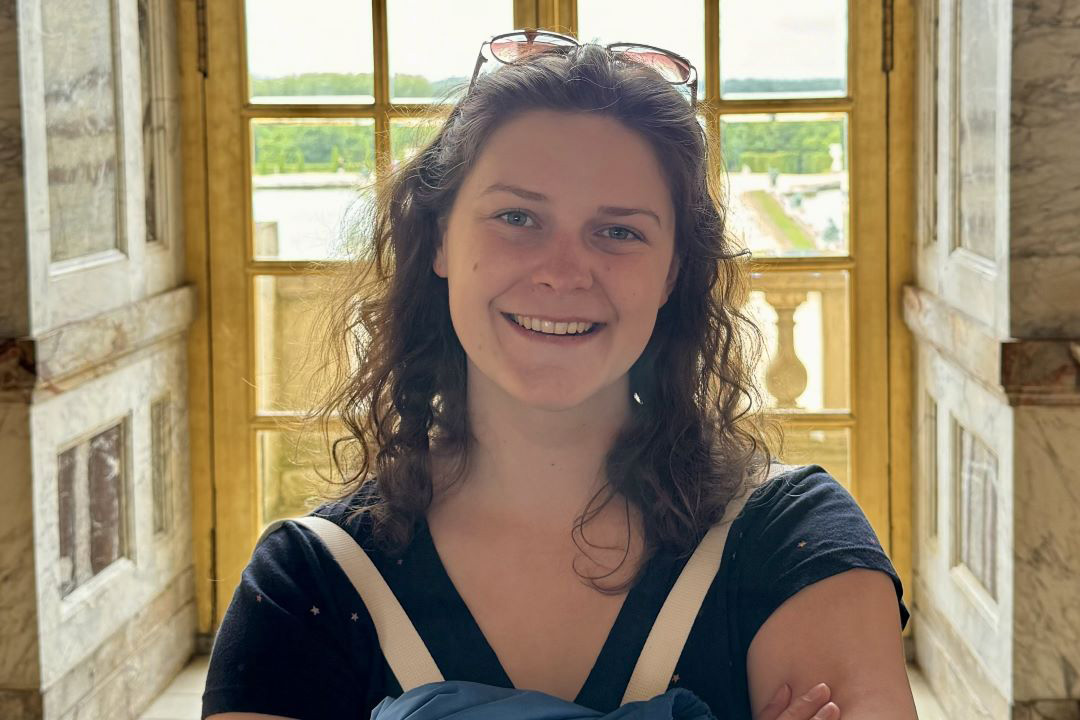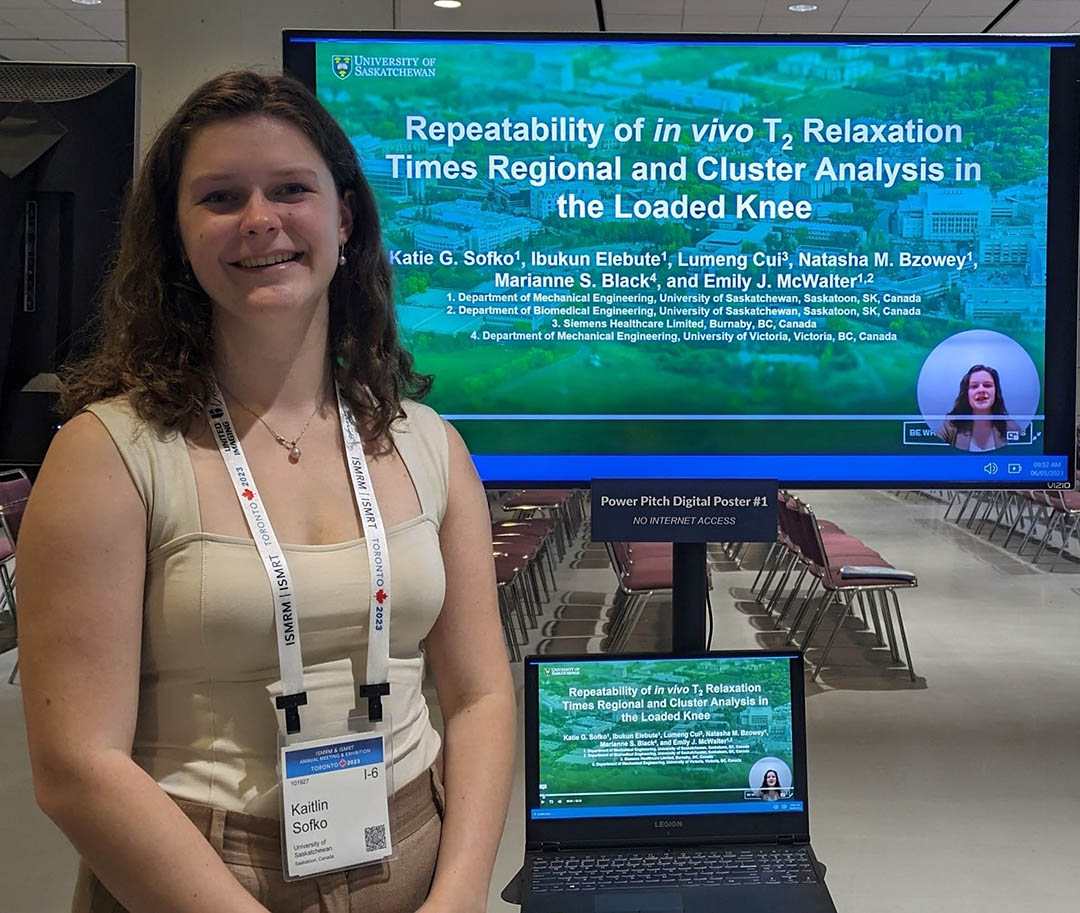
USask Engineering graduate heading to Stanford for her PhD
A University of Saskatchewan (USask) College of Engineering graduate has been accepted to study in an innovative new PhD program at one of the world’s best medical schools.
By Donella HoffmanKatie Sofko, who graduates this week with a bachelor’s degree in mechanical engineering, is one of six students who will join the Biomedical Physics (BMP) Graduate Program in September at the Stanford University School of Medicine. More than 100 people from around the world applied for a spot.
“It really focuses on the intersection of engineering and physics with medicine and applying that to real-world medical problems,” Sofko explained in a recent interview. “That is what drew me to the program. I just love that idea; it’s what I've wanted to do for most of my life.”
Stanford Medicine is the world’s fourth-ranked medical school in the latest QS World University Rankings; Stanford University placed sixth in the overall rankings.
Sofko’s success is based on an impressive blend of enthusiasm and aptitude, said Dr. Emily McWalter (PhD), an assistant professor in USask Engineering who has supervised Sofko’s undergraduate research for more than three years.
“It’s a rare combination when someone is that intelligent and has that much drive and vision for what they want. When you have that in one package, the sky’s the limit,” McWalter said of Sofko, who earned the Harold J. Bosche Most Distinguished Prize in Mechanical Engineering for achieving the highest average among students graduating in the discipline this spring.
Sofko also served as president of the Mechanical Engineering Students’ Association during her final year in the college.
“She’s definitely one of the top students I’ll ever have the opportunity to work with,” McWalter said.

Sofko grew up in Saskatoon and attended Walter Murray Collegiate Institute. She thought she would study medicine or orthodontics but discovered during her Biology 30 class in Grade 12 that she wasn’t very interested in dissection – a big part of a medical degree – so she pivoted to engineering.
She chose to major in mechanical engineering but kept her eyes open for opportunities to pursue biomedical engineering. Halfway through her second year, she sought out McWalter, whose research focuses on using novel, quantitative magnetic resonance imaging (MRI) techniques to understand knee joint and soft tissue function in degenerative diseases such as osteoarthritis. Working with McWalter, as part of the college’s Goodfellow Undergraduate Research Award program, was the catalyst for Sofko’s enthusiastic and ongoing fascination with MRI technology.
“They’re incredible machines,” she said. “When I started learning about the technical aspects of MRI and the physics that goes into being able to produce the images that you get, I just loved them.”
“The images are quite striking. The quality of soft tissue contrast, the internal structure that we can see from MRI isn't something you see as much in other imaging modalities.”
In 2022, Sofko became the first USask Engineering student to do an international co-op work placement when she secured an internship at Siemens Healthineers, one of the top medical technology companies in the world.
“The experience was incredible,” she said of working at company headquarters in Erlangen, Germany. “I mean, I was at the factory where MRI were being made. I use MRI in my research, so it was really exciting to get to experience hands-on what goes into developing MRI and improving the different hardware of MRI.”
In her research, Sofko has explored the repeatability of two methods for assessing changes in the cartilage of the knee with the application of load, using quantitative MRI.
During her undergraduate research career, Sofko twice had abstracts accepted at the annual meetings for the International Society for Magnetic Resonance in Medicine and presented at the conferences.
“Getting that experience on an international level was completely foundational in establishing myself as a researcher and getting to know the research community,” she said.
McWalter, who spent five years at Stanford as a post-doctoral fellow and research associate, marvels at how Sofko has made the most of her opportunities to connect with academics in her field.
“Her networking is excellent not because she’s talking to lots of people and getting her name out there, but because she has meaningful, scientific conversations with senior professors.
“They love talking to her because she’s so engaged and asks great questions,” McWalter said.
After she applied for the Stanford PhD program, Sofko was one of 24 people selected for interviews, which were held online and covered three full days. She said she was surprisingly relaxed during the process because she knew the outcome would not deter her from her ultimate path.
“One of my main messages was that biomedical physics is what I want to do with my life, no matter what, and that specifically their program really appealed to me because of its translational aspects in that they have a close relationship with their hospital on campus and opportunities for clinical application.”
Her acceptance and impending move to Palo Alto, Calif., is very exciting for her parents, siblings, and her grandparents.
“I have a very supportive family and I have been so incredibly fortunate to have Emily as my supervisor. She provided me with so many opportunities that allowed me to develop as a researcher.”
Sofko is also grateful for the USask Best and Brightest $24,000 entrance scholarship that she received, as well as College of Engineering awards she earned while studying for her undergraduate degree. “I’m really grateful to USask for all of that support.”
Sofko expects to earn her PhD in five years and, at this point, envisions a career doing research and development in the medical field.
McWalter said Sofko has made the most of her opportunities and positioned herself well for the next step in her academic career.
“They’re looking for the best of the best, and Katie is among that best.”
Together we will support and inspire students to succeed. We invite you to join by supporting current and future students' needs at USask.

